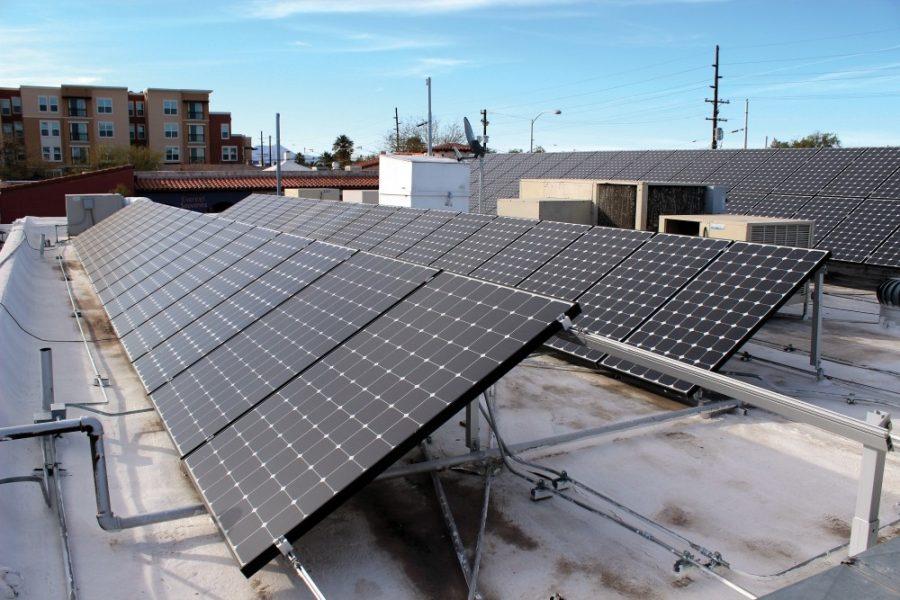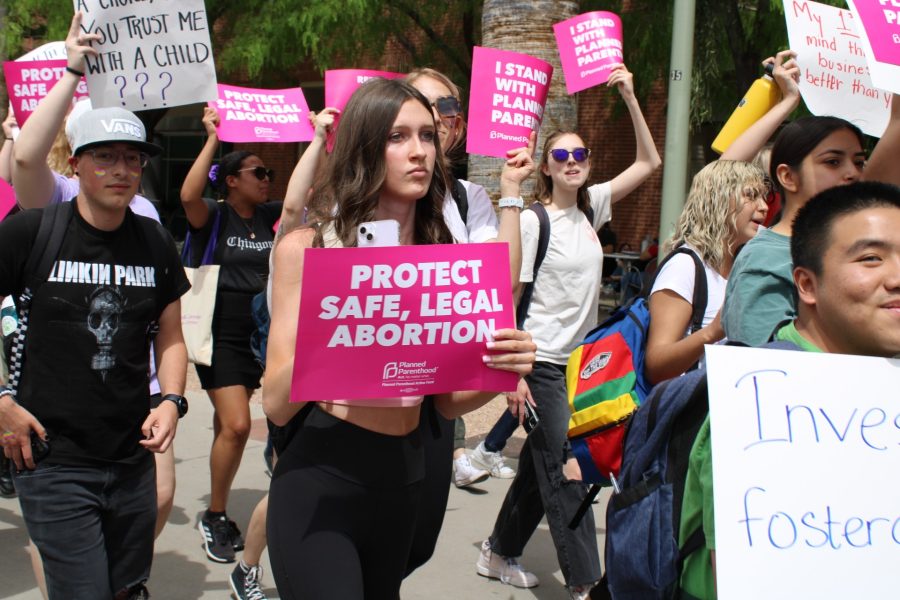While solar and wind energy continue to make up a large percent of energy production around the world, Trump’s decision to pull out of the Paris Accord may lead to fewer renewable energy options here in the U.S.
Pledged countries are permitted to initiate as little or as much as they desire toward the effort, and still remain a party.
“It baffles me,” said UA Professor and dendrochronology researcher Valerie Trouet. “Most people who don’t believe in climate change don’t know that this was a voluntary agreement.”
She worries that other countries may follow the U.S., one of the world’s main polluters, and pull out.
Trouet, who attended the Paris Climate Change Conference back in 2015, analyzes tree rings to evaluate historical climate changes. She said increased temperatures in the arid Southwest will trigger regular, high-intensity wildfires.
“The Southwest is the most vulnerable area when it comes to climate change,” Trouet said. “Every extra degree we get is one too much.”
Despite Trump’s claim that renewable energy developments are harmful to the economy, the U.S. Department of Energy released its annual report early this year, stating solar power alone employed 21 percent more people than the coal, gas and oil industry in 2016.
Arizona was ranked the seventh solar-leading state last year at 7,310 employees, according to the Solar Foundation’s 2016 National Solar Jobs Census.
Tucson has unique potential for implementing and applying solar power.
Russell Lowes, Energy Chair at the Sierra Club, said many people are deterred from renewable energy when utility companies, like Tucson Electric Power, propose and eventually implement higher rates.
If approved by the Arizona Corporation Commission, TEP’s proposal will provide affordable solar options, reduce consumer expenses and direct additional renewable energy to cost-effective systems, according to the TEP website.
RELATED: Despite policy efforts, natural gas slowly replacing coal
However, Lowes, who has a background in power plant economics, said TEP’s “Time-of-Use distributed generation” plan could actually add hundreds of dollars to solar users energy bill.
“The capacity [customers] are having to pay for and what distribution is having to pay for is going to increase costs dramatically,” Lowes said. He worries that as people pull out of the Tucson grid, utility companies will experience an “unutilized transmission grid.”
As a solar rooftop owner, Lowes prefers to stay in the grid and recycle his excess solar energy “to keep other people from burning coal power.” Yet, he too feels discouraged by TEP’s ever-rising solar fees.
He said this probable solar grid defection will surge the burning of fossil fuels, obstructing what could have been a smooth renewable energy transition.
“Energy is the biggest component of the Paris Climate Accord and its biggest solution, but right now old energy is the biggest emitter of CO2,” Lowes said. “With this reversal from Trump, the U.S. has become a [renewable energy] ‘lagger,’ unless the cities, counties and states take the lead away from the federal government and go for the more appropriate energy options.”
Trump’s widely-criticized decision spurred debate over the potential national and local repercussions.
Diego Martinez-Lugo, an incoming geography graduate student and former Green Fund vice chair, fears that as the heat intensifies, polarization based on Tucson residents’ socio-economic status will too.
With a passion for sustainability and environmentalism, he works to represent underprivileged Tucsonans.
“Rates that homeowners pay are going to go up,” Martinez-Lugo said. “It’s going to be even more difficult for low-income communities and communities of color to afford their energy bills.”
RELATED: Last week in science: Climate change policy and memory science
He said the energy burned to produce air-conditioning ultimately contributes to higher temperatures, which residents “solve” by using more air-conditioning and thus burning mostly fossil fuels, further justifying the need to use green energy within the city.
Although Martinez-Lugo believes the Paris Climate Accord acts as a foundation to advance constructive, universal transformation, it arguably lacks specific stipulations, such as fossil fuel reduction.
“It is important to take away that climate action is up to individuals to pressure one another and their states to act,” Martinez-Lugo said.
Based on the contract, Trump’s retraction from the Paris deal will only kick in after a mandatory four-year process, which means the U.S. will remain a participant for most of his presidential term.
Trouet, Lowes and Martinez-Lugo, among others, agree that the withdrawal created a symbolic counter movement, baiting dedicated citizens into reclaiming environmental advocacy close to home.
Regardless of Trump’s decision to leave, 279 leaders from across the nation have pledged to uphold the Paris accord as of June 9.
On June 1, Tucson Mayor Jonathan Rothschild publicized his alliance with the “Climate Mayors,” whose objectives align with the global agreement’s by “reducing greenhouse gas emissions and supporting federal and international policymaking.”
“The City has taken many steps to reduce our carbon footprint—currently, about 12 percent of our energy comes from solar—but we can do more,” Rothschild said in a written statement. “We can lead by example, as a city government. We can encourage others to do the same, through incentives. I’m working with staff on a number of ways to come at this challenge, setting goals for energy efficiency and renewable energy and looking at incentives.”
Follow Tori Tom on Twitter.









